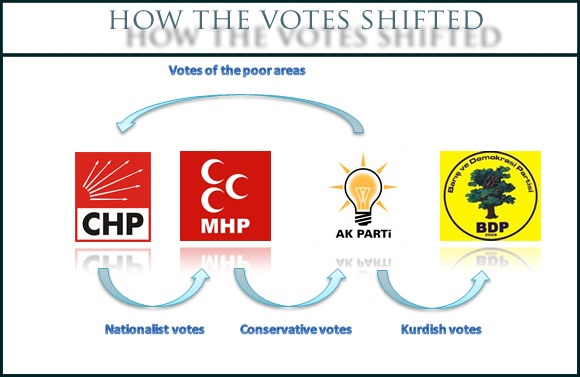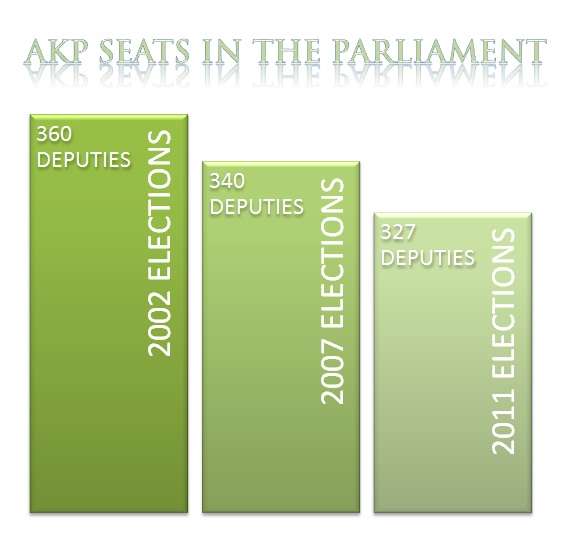2011 TURKISH GENERAL ELECTIONS: WHO REALLY WON?
Dimpool Analysis Team
BURHAN GURDOGAN
01 July 2011
On June 12, 2011, Turkey’s 17th general election was held to elect 550 deputies for the Turkish Grand National Assembly (TBMM). According to official results the Justice and Development Party (AKP) won its third time consecutive landslide win by obtaining 49 % of the votes and 327 seats in the parliament. -This came after the Supreme Committee of Elections (YSK) stripped Hatip Dicle of his mandate and the AKP’s candidate Oya Eronat took his place.

- How the votes shifted in 2011 Turkish General Elections
Election Process
The Justice and Development Party (AKP)
The AKP, which set a goal to reach the constitutional majority (367) in the pre-election process, carried out an aggressive campaign against all of its opponents with the financing, bureaucratic power, and experience which are acquisitions of being in power since 2002. In the Kurdish areas the AKP propagandized religion, and it made an attempt to shift the votes from the MHP to itself in order to cover its losses as a result of a Kurdish opening fiasco propagandizing over nationalism.
While other political parties were complaining that the municipal authorities controlled by the AKP were setting the prices of the billboards too high, it was hard to find a wall or building that the AKP flag or poster was not displayed upon.
As the AKP realized this fact, they also determined that in order to reach the constitutional majority, only two parties should be represented in the Assembly. For that reason, the AKP aimed at the MHP, knowing that this party had the highest probability of being unable to make the cut in the elections. The AKP attacked the MHP over sex tape scandals of high level MHP administrators, especially at the beginning of the pre-election process, but after a short time the AKP discovered that its attacks were backfiring and the MHP was gaining votes.
The Republican People’s Party (CHP)
The CHP, which entered the election process with new leader Kemal Kilicdaroglu, set a lofty goal in desiring a landslide win. However, excluding its party organizations in the deputy candidate selections and the physical impossibilities caused a serious setback for the CHP’s performance.
Even though oral promises such as “600 Turkish Liras to each poor family” or “legislative resolutions devoted to retirees” have gained many votes for the CHP, the base of the party began a search for alternatives, as the main values of the CHP (such as laicism and kemalism) have gone by the board.
The Nationalist Movement Party (MHP)
The MHP gained an incredible amount of sympathy from the public because it was the most attacked party over the secret recordings, in Turkey.
The REAL Winners
The Nationalist Movement Party (MHP)
Despite many of its high-ranked members having to resign after their sex tape scandals, leaving leader Devlet Bahceli holding the bag in all of the pre-election process, it should definitely be considered a victory since the MHP passed the 10% threshold.
The secret of this success can be explained thus; after losing the conservative-nationalist votes, the MHP has filled that space with the kemalist votes that are separated from the CHP. Moreover, many people voted for the MHP in order to prevent the AKP from acquiring the constitutional majority in the Assembly.
The Peace and Democracy Party (BDP)
The BDP, which entered the elections with independent candidates since it could not pass the 10 % threshold, organized very successfully by electing 36 deputies, and in several cities it won more than one deputy. In cities like Diyarbakir it won nearly all possible slots, barring one or two losses.
Due to the AKP’s unsuccessful Kurdish policies the BDP came forward as the only alternative for Kurdish people and it became the only party that crushed the aid-based AKP campaign in some areas.
When one considers the fact that all of the independent candidates elected are BDP-supported candidates, it should be considered a great victory to win 36 seats in the Parliament.
The REAL Losers
The Republican People’s Party (CHP)
Even though it seemed that the CHP raised its votes compared to prior elections by getting 26 % of the votes in a period where there were no serious alternatives, the CHP should certainly be considered the losers of the election.
While trying to imitate the AKP policies, the CHP could not prevent kemalist and secularist votes from shifting to the MHP. Moreover, since it tended to exclude city organizations and members who worked day and night for the party, its policies toward the Kurdish people did not get accepted in the region.
When new leader Kemal Kilicdaroglu was first elected, the polls showed that the CHP’s votes were around 30% and the AKP’s votes were around 35 %, so the serious difference between the end results and the polls proves that the CHP has lost a serious number of votes under Kilicdaroglu’s leadership.
The failure in the elections may result in a party leadership change, as the intraparty opposition movement already drafted a petition for a general assembly. At this point, it is hard to estimate whether Kilicdaroglu can handle both the in-party pressure and outside pressure.
The Justice and Development Party (AKP)
No party in the world can be considered as a loser after increasing its votes and having a third time landslide win in its third elections, yet if that party’s seats in the assembly has been decreased to a majority that cannot even propose a constitution, that party should be considered as a loser, as it could not meet its lowest expectation.
Besides the deputy count, the fiasco in the Kurdish opening caused a serious decrease in the Kurdish areas. Moreover, since the detention of the BDP deputies still continues it poses a great danger of losing control of the Kurdish area completely.
Due to the public fragmentation over issues such as the Ergenekon investigation or the Kurdish problem, the AKP has reached its maximum votes, but it has still managed to lose 14 seats as compared to the 2002 elections.
If the AKP wants to pass a new constitution, Prime Minister Recep Tayyip Erdogan should remember the true meaning of democracy, not only in his victory speeches from the balcony, but also in making decisions that concern the country’s agenda.

- AKP seats in the parliament
You might also want to read[srp srp_number_post_option=’5′ srp_widget_title=’ ‘ srp_thumbnail_wdg_height=’60’ srp_thumbnail_wdg_width=’60’ srp_include_option=’996, 793, 766′ srp_thumbnail_option=’yes’ srp_content_post_option=’titleonly’] |
